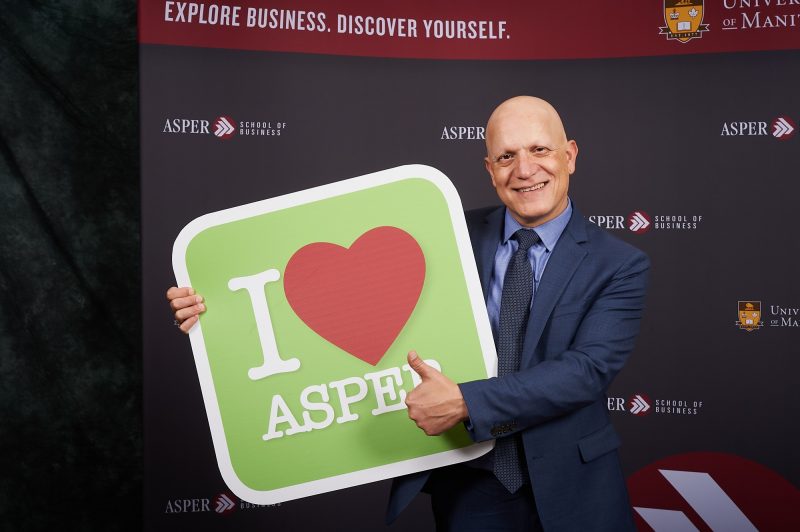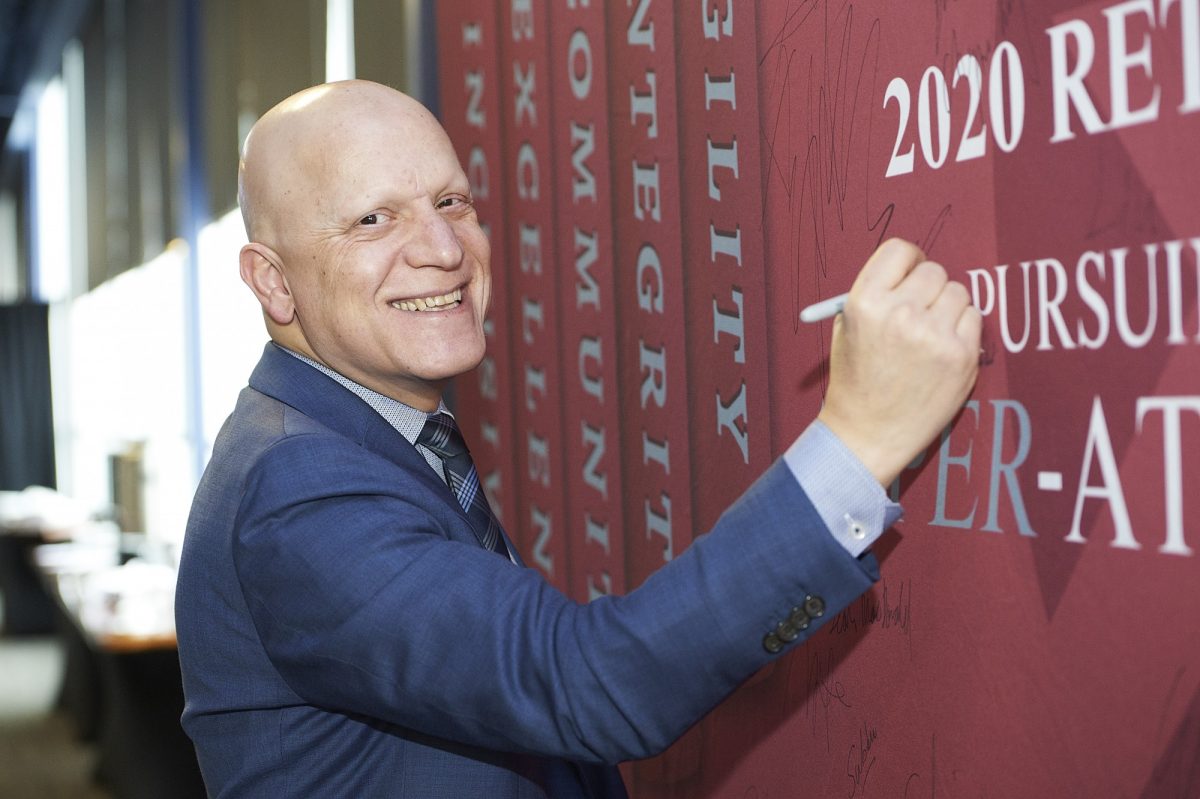
Departing Asper School of Business Dean reflects on his tenure
Jacoby’s commitment to student experience, EDI and the Drake Building will leave a lasting legacy.
On September 30, Dr. Gady Jacoby will close a chapter in his life at the Asper School of Business. After close to four years as Dean and CPA Manitoba Chair in Business Leadership, Jacoby will be returning to Israel to take on the position of Dean of the School of Economics at the College of Management Academic Studies in Rishon LeZion.
Dr. Jacoby began his career at Asper as an Assistant Professor in 1998. He left in 2009 to teach at Seton Hall University in New Jersey, but returned to Asper four years later. Since his return, he has served as the Bryce Douglas Professor in Finance, Associate Dean (Research and Graduate Programs), and for the past four years, the School’s Acting Dean and then Dean.
As Dean, Dr. Jacoby spearheaded many initiatives that will leave a lasting impact at Asper: enhancements to the Stu Clark Graduate School programs, significant renovations to the Drake Centre – the School’s physical home, a commitment to enhancing reconciliation and Indigenous Business education, and one of the most proactive stances on equity, diversity and inclusion (EDI) of all UM faculties. All of this built around an overall goal to support an outstanding student experience.
The Asper Communications Team interviewed Dr. Jacoby as he prepared to for his move back to Israel, and he spoke about his most memorable moments, lessons for the next Dean and what he will miss most about Asper.
Asper Communications: You had an opportunity to shape the Asper School of Business in your time as a faculty member, as Acting Dean and as Dean. Did you have a plan from the beginning or did it evolve?
Jacoby: When I started the role I had some plans, for example, the growth of the School’s graduate programs was something that I knew I wanted to pursue. I also wanted a leadership team that reflected our faculty diversity. I also planned to prioritize research and boost research support in the School, enhancing the upward trajectory in research quality we experienced over the past decade.
However, many new ideas were added as the role evolved. When I became Dean, other areas needed to be prioritized, including the importance of elevating reconciliation and Indigenous inclusion. This was actually something I started working on as Acting Dean when we established the Indigenous Awareness Infusion Committee. Redeveloping Drake was also on my mind and after realizing we had the means, we started investing in building upgrades.
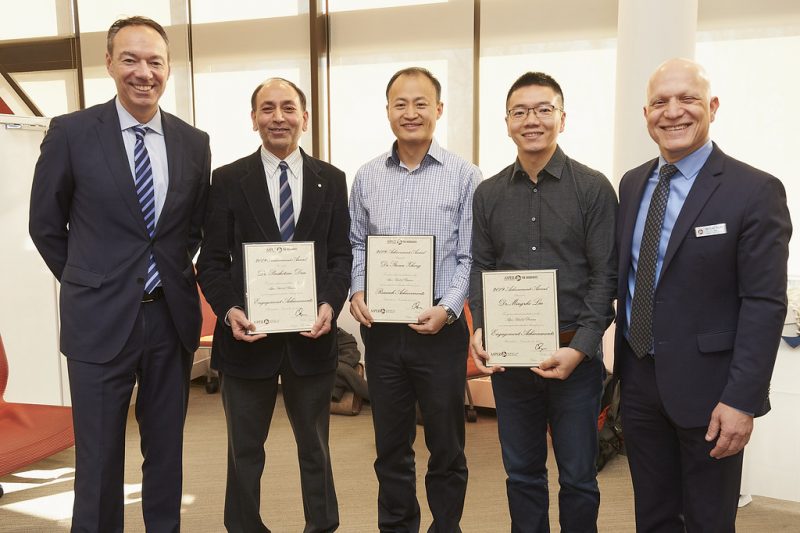
Asper Communications: Why was upgrading the building important to you, and what component of the building are you most proud of and why?
Jacoby: The Drake Centre is 34 years old and its age has started showing. We have some spaces that only required painting, but other areas were non-functional. There was, in my view, inefficient usage of the space in some areas that had to be renovated to elevate the school to 21st century design. Having a professional-looking business school is important for a U15 university and there also needs to be a sense of pride in the School. In my view, a building that makes us feel proud contributes tremendously to a sense of shared identity and the quality of work from students, staff and faculty.
The most significant transformation for me is the fifth floor, the new home for our Stu Clark Graduate School. It now has an extremely high-end professional look and this is important to house the lucrative and pricy professional graduate programs. To successfully compete for quality graduate students, we had to bring ourselves to the norm of other business schools who provide similar programming and a professional environment.
In addition, a PhD defence room was created on the fifth floor. This room was developed to signal the importance of this event for us in the life of the School, and as such, we recognize it by having a dedicated room that can now also be used for other things outside of PhD defences.
At same time, other building investments support improved learning experience. For example, many new Asper classrooms are active learning classrooms, equipped with a reconfigurable furniture setup, white boards installed on all walls and high-tech built-in audio-visual equipment. This arrangement and the formulation of the classroom make teaching and learning more flexible, improve group work arrangements and facilitate in-class interactions and online interactions with guests appearing virtually.
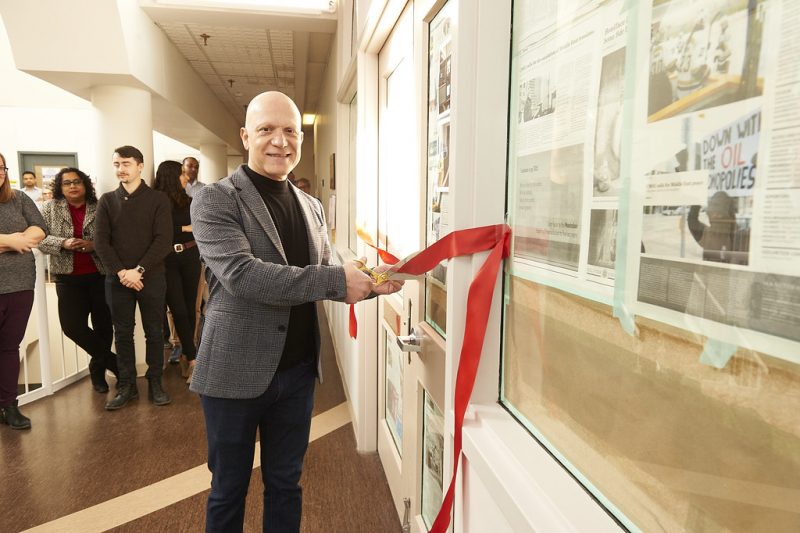
Asper Communications: As an individual who did not grow up in Canada, how quickly into your time at Asper did you come to understand the importance of including an Indigenous perspective in Business Education?
Jacoby: I have to say that I was completely unaware of the realities until I became Acting Dean. I had Indigenous friends in the city, I had knowledge of the history, and in general, I knew about residential schools. However, knowledge and awareness are two different things. I knew that an injustice had happened here and it still exists. However, before I was in this leadership position I did not think I had any influence. It is something that you care about, but you feel that you are limited in how you can help, which is wrong. Now I see that everybody can help, even if it is only in a small way.
However, we are not well versed within our own country, even fellow Canadians [who] are born here have some knowledge, but it is limited. Each one of us has a responsibility to reconciliation, just like any other Canadian, no less no more, whether you’re born here or not. We all live on Indigenous land and we have the same responsibilities to the Indigenous communities and to the process of reconciliation.
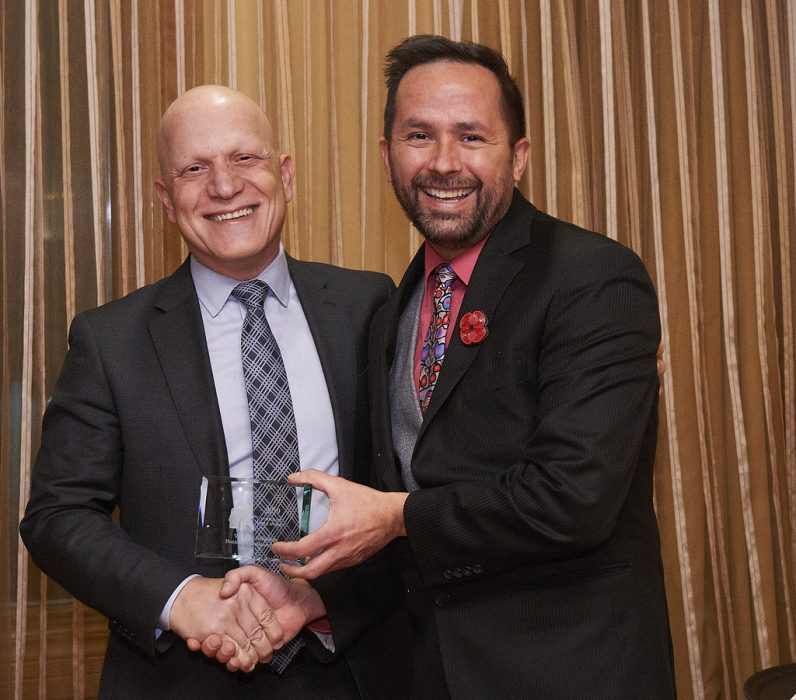 Asper Communications: As a faculty, Asper has taken one of the most direct stances to prioritize EDI. How do you feel about being a leader in this area and why was it important to you?
Asper Communications: As a faculty, Asper has taken one of the most direct stances to prioritize EDI. How do you feel about being a leader in this area and why was it important to you?
Jacoby: Social justice has always been important to me. Ever since I was a kid, I have always felt discomfort with injustice and an urge to do something. However, my commitment to EDI at Asper started last summer with the series of articles that came out in the Globe and Mail and other mainstream media outlets. While Asper was not mentioned in these articles, I did not fool myself to think that we didn’t have some of the same problems they referenced. I knew we needed to gauge where we were on this issue as a School. To me, it is not acceptable if there is even one case of discrimination.
Signalling is extremely important and that is why actually the first action was EDI training. I wanted the school leadership, including me, to be trained first. That was a signal to the community that the School leadership views this as a priority, which is important when you want to change the culture.
The Asper School of Business faculty body is extremely diverse, possibly one of the most diverse business schools in North America. We wanted to take advantage of that diversity through the development of an EDI Task Force.
The task force co-chairs and Asper Associate Deans, Suzanne Gagnon, Subbu Sivaramakrishnan and I agreed that we want to be fully transparent about everything. For example, posting reports and recommendations on our website for everybody to see. Accountability is extremely important with this process. We cannot just set targets and hope that it is going to happen. We have to have accountability to measure ourselves, and if we fail, we have to acknowledge our failure.
Asper Communications: The Asper School of Business has a strong connection with the business community. How did that play a role in your time as Dean?
Jacoby: The interface with the business community is very strong in many different ways. Many of the people in this community are UM graduates, and many of them are Asper graduates with a strong affinity for the School. Our main goal is to provide an academically rigorous program, but we also want to know what industry wants so we can accommodate and modify our curriculum to deliver that. It is a win-win for everybody.
The business community often provides support when we develop programs. When we developed the Master of Supply Chain and Logistics Program, many logistics and supply chain and transportation companies in Winnipeg supported us and our application to the province. We’re very lucky to have that support.
We also receive a lot of support from The Associates. During COVID, The Associates gave $50,000 to support students who lost their co-op positions or summer jobs. They also give us an annual gift, which is extremely helpful as it allows us to support student activities and the Faculty Achievement Awards, and this support is very important for the school.
The support of the business community is also reflected in the donations our School receives. The financial support we receive from donors and members of our business community is outstanding. It goes to students, our research and our research facilities like the Stu Clark Graduate School on the fifth floor. I will never forget the day we received $6 million from Stu Clark to create a Behavioural Management Research Centre.
Now, the money is great, and it is a good way to support the school, but actually, the most crucial support, in my view, is the mentorship of our students. This could be in the form of coaching a case team, judging case competitions, or participating in events such as our gala dinners and luncheons we have for the new students. The strong commitment of members of the Associates of the Asper School has made all this possible.
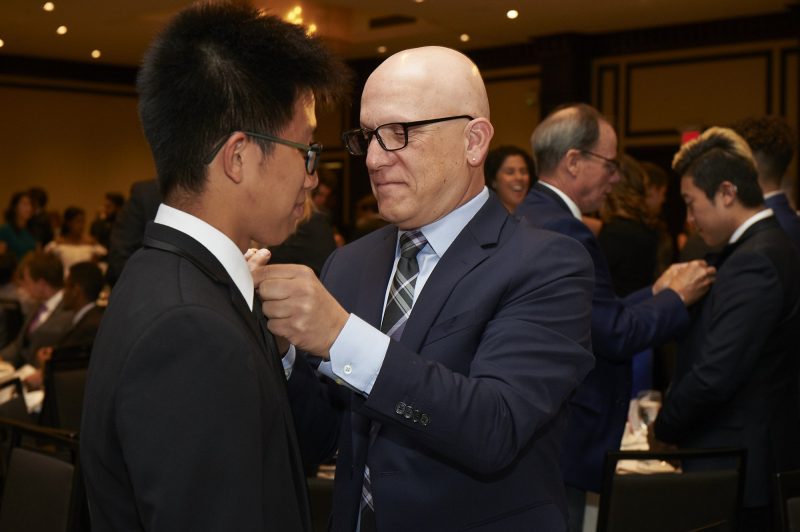
Asper Communications: What are your most memorable student experiences or initiatives and why?
Jacoby: There are so many, but one of the first that comes to mind is the Entrepreneurship Pitch Competition.
We introduced a new entrepreneurship core course in 2019 and as part of that course, there is an Elevator Pitch Competition. This course was spearheaded and taught by Zhenyu Wu, a Canada Research Chair in Entrepreneurship and Associate Dean Research, and Wenlong Yuan, the Stu Clark Chair in Entrepreneurship, together with colleagues. The pitch competition was run by the Stu Clark Centre for Entrepreneurship under the amazing leadership of Deborah Jonasson-Young and her staff, Amy Jones and Lindsay Friesen.
I was asked to speak at the first event as part of the competition, which took place on a Friday evening in the Asper fishbowl. When I stepped out of the Dean’s Office and went around the corner, I saw hundreds of students and felt the electrifying atmosphere.
This moment was memorable, as I had the opportunity to witness the positive impact of something we created – the electricity in the room, and the enthusiasm of the student community. When you see the impact on the students, it is extremely gratifying. This type of student experience is what made my role as Dean so rewarding.
Another example of the value of the student experience is the Asper student participation in case competitions. We prioritized experiential learning in our Pursuing our Asper-ations strategic plan. As part of that priority, we hired Judy Jayasuriya to become Asper’s Lead in Experiential Learning.
In that role, Judy has made a huge impact in our student case competition success, both in the number of virtual competitions students participate in and in the placing of our students in these competitions. I often hear feedback about how polished our students are in the competitions and I know that is a result of Judy’s coaching and student preparation.
You see the positive impact on our students and you can feel their sense of achievement.
The Asper School is AACSB accredited, a distinction reserved to less than five percent of business schools worldwide. In its new accreditation standards, AACSB placed experiential learning as an important goal an accredited School should pursue. As the Associate Dean in charge of accreditation, Bruno Silvestre (also incoming Acting Dean) has played an important role in building a self-evaluation process to ensure we deliver top-notch experiential learning opportunities to our students.
Asper Communications: What advice do you have for the new Dean coming after you?
Jacoby: What guided me throughout my role as dean was the importance of having a goal; knowing that goal and pursuing that goal in everything you do. I asked myself, “is this decision contributing to that goal or not?” If it is not, I do not pursue it.
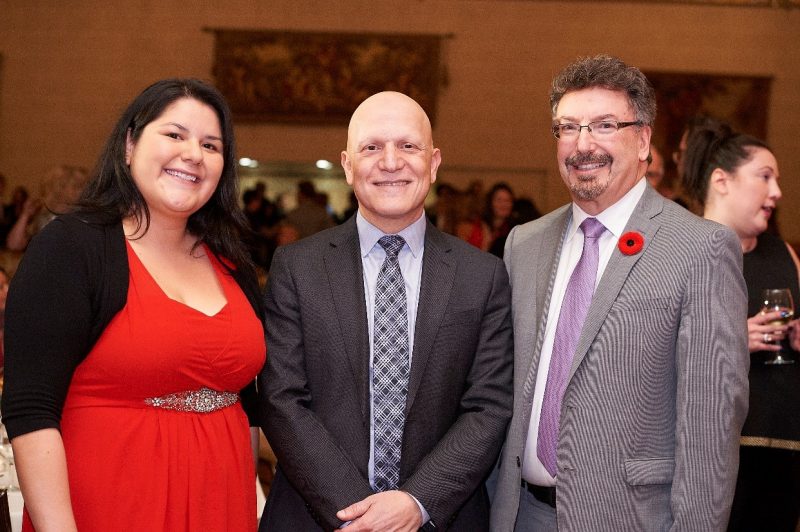
My goal as Dean was to provide the best student experience possible. Ultimately, if we provide a good student experience this is good for the School, the university, the city and the province.
Really, student experience applies to everything, even in the areas of faculty research. We are always looking to retain our top faculty members by supporting outstanding research opportunities. If we retain our best researchers, we retain our best teachers and that supports an outstanding student experience.
Asper Communications: What precipitated your move?
Jacoby: For me, going back to Israel was always very important. I have my family there and I want to spend some good years with [them] and my childhood friends. I left Israel was I was 30 years old. I have spent 27 years in North America, but much of my adult life was in Israel and to me it is a natural move.
At the same time, I also feel that the Asper School of Business is at a good point and we have accomplished many things that are here to stay. I wanted to leave at a time where I felt that the School was ready. Thanks to a strong team and amazing faculty and staff, I feel it is.
Asper Communications: What will you miss about Asper?
Jacoby: The people. I will miss the Asper students, staff and faculty tremendously.
The human component and the interpersonal relationships – that is what I enjoyed the most about my experience here. I have so many friends here that I gained over the years. It is difficult for me; this is not [an] easy time for me. Because of these strong relationships, I am moving with ambivalence. I am at peace with my decision to return to Israel, but it is not to say that I am not still ambivalent as saying goodbye to my colleagues and friends is emotionally difficult.
